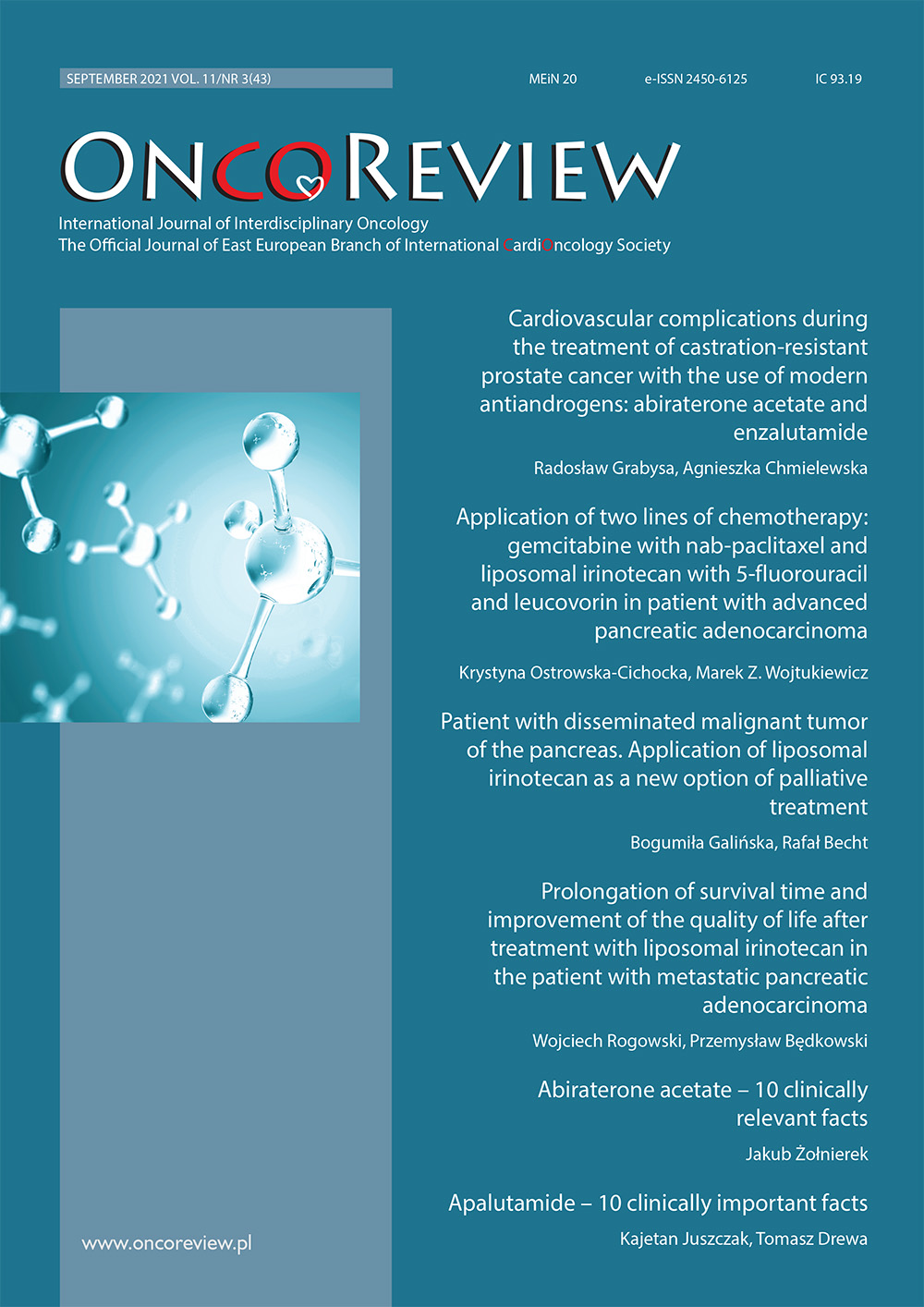Abiraterone acetate – 10 clinically relevant facts Artykuł przeglądowy
##plugins.themes.bootstrap3.article.main##
Abstrakt
Prostate cancer is one of the most frequently diagnosed cancers in men. Number of newly diagnosed cases is increasing due to several factors and the most important ones seem to be: population ageing and more sensitive diagnostic procedures. Secondary – the higher efficacy of treatment with its influence on improving patients’ overall survival and the specific mechanism of action of drugs used in systemic therapy lead to growing population of men suffering from prostate cancer in general and, specifically – patients with castration resistance. It is hormone therapy to play the key role in systemic treatment of prostate cancer with increasing significance of novel drugs focused on inhibition of molecular signal transduction mediated by androgen receptor. Abiraterone acetate is the representative of this therapeutic class. The paper describes the most clinically relevant data regarding the drug.
Pobrania
##plugins.generic.paperbuzz.metrics##
##plugins.themes.bootstrap3.article.details##

Utwór dostępny jest na licencji Creative Commons Uznanie autorstwa – Użycie niekomercyjne – Bez utworów zależnych 4.0 Międzynarodowe.
Copyright: © Medical Education sp. z o.o. This is an Open Access article distributed under the terms of the Attribution-NonCommercial 4.0 International (CC BY-NC 4.0). License (https://creativecommons.org/licenses/by-nc/4.0/), allowing third parties to copy and redistribute the material in any medium or format and to remix, transform, and build upon the material, provided the original work is properly cited and states its license.
Address reprint requests to: Medical Education, Marcin Kuźma (marcin.kuzma@mededu.pl)
Bibliografia
2. Attard G, Reid AH, Yap TA et al. Selective Inhibition of CYP17 With Abiraterone Acetate Is Highly Active in the Treatment of Castration-Resistant Prostate Cancer. J Clin Oncol. 2009; 27(23): 3742-8.
3. Reid AH, Attard G, Danila DC et al. Significant and sustained antitumor activity in post-docetaxel, castration-resistant prostate cancer with the CYP17 inhibitor abiraterone acetate. J Clin Oncol. 2010; 28(9): 1489-95.
4. Danila DC, Morris MJ, de Bobo JS et al. Phase II Multicenter Study of Abiraterone Acetate Plus Prednisone Therapy in Patients With Docetaxel-Treated Castration-Resistant Prostate Cancer. J Clin Oncol. 2010; 28(9): 1496-501.
5. Ryan CJ, Smith MR, Fizazi K et al; COU-AA-302 Investigators. Abiraterone acetate plus prednisone versus placebo plus prednisone in chemotherapy- naive men with metastatic castration-resistant prostate cancer (COU-AA-302): final overall survival analysis of a randomised, double-blind, placebo-controlled phase 3 study. Lancet Oncol. 2015; 16(2): 152-60. http://doi.org/10.1016/S1470-2045(14)71205-7.
6. de Bono, Logothetis CJ, Molina A et al; COU-AA-301 Investigators. Abiraterone and increased survival in metastatic prostate cancer. N Engl J Med. 2011; 346(21): 1995-2005.
7. Fizazi K, Scher HI, Molina A et al; COU-AA-301 Investigators. Abiraterone acetate for treatment of metastatic castration-resistant prostate cancer: final overall survival analysis of the COU-AA-301 randomised, double-blind, placebo-controlled phase 3 study. Lancet Oncol. 2012; 13(10): 983-92.
8. Khalaf DJ, Annala M, Taavitsainen S et al. Optimal sequencing of enzalutamide and abiraterone acetate plus prednisone in metastatic castration- resistant prostate cancer: a multicentre, randomised, open-label, phase 2, crossover trial. Lancet Oncol. 2019; 20(12): 1730-9. http://doi.org/10.1016/S1470-2045(19)30688-6.
9. Mori K, Miura N, Mostafaei H et al. Sequential therapy of abiraterone and enzalutamide in castration-resistant prostate cancer: a systematic review and meta-analysis. Prostate Cancer Prostatic Dis. 2020; 23(4): 539-48. http://doi.org/10.1038/s41391-020-0222-6.
10. Khalaf DJ, Sunderland K, Eigl BJ et al. Health-related Quality of Life for Abiraterone Plus Prednisone Versus Enzalutamide in Patients with Metastatic Castration-resistant Prostate Cancer: Results from a Phase II Randomized Trial. Eur Urol. 2019; 75(6): 940-7.
11. Thiery-Vuillemin A, Poulsen MH, Lagneau E et al. Impact of Abiraterone Acetate plus Prednisone or Enzalutamide on Patient-reported Outcomes in Patients with Metastatic Castration-resistant Prostate Cancer: Final 12-mo Analysis from the Observational AQUARiUS Study. Eur Urol. 2020; 77(3): 380-7.
12. Shore ND, Saltzstein D, Sieber P et al. Results of a Real-world Study of Enzalutamide and Abiraterone Acetate With Prednisone Tolerability (REAAcT). Clin Genitourin Cancer. 2019; 17(6): 457-63.
13. Auchus RJ, MK Yu, Nguyen S et al. Use of Prednisone With Abiraterone Acetate in Metastatic Castration-Resistant Prostate Cancer. Oncologist. 2014; 19(12): 1231-40.
14. Dorff TB, Crawford ED. Management and challenges of corticosteroid therapy in men with metastatic castrate-resistant prostate cancer. Ann Oncol. 2013; 24(1): 31-3.
15. Fizazi K, Chi KN, De Bono JS et al. Assessment of corticosteroid (CS)-associated adverse events (AEs) with long-term (LT) exposure to low-dose prednisone (P) given with abiraterone acetate (AA) to metastatic castration-resistant prostate cancer (mCRPC) patients (Pts). J Clin Oncol. 2015 33(supp.l 7): 169-169.
16. Fizazi K, Tran N, Fein L et al. Abiraterone plus Prednisone in Metastatic, Castration-Sensitive Prostate Cancer. N Engl J Med. 2017; 377(4): 352-60.
17. Small EJ, Saad F, Chowdhury S et al. Apalutamide and overall survival in non-metastatic castration-resistant prostate cancer. Ann Oncol. 2019; 30(11): 1813-20.

